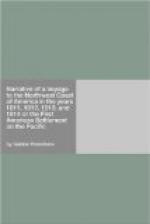After making two portages, we arrived on the banks of Beaver river, which was here but a rivulet. It is by this route that the canoes ordinarily pass to reach Little Slave lake and the Athabasca country, from the head of Lake Superior, via., Cumberland House, on English river. We were obliged by the shallowness of the stream, to drag along our canoes, walking on a bottom or beach of sand, where we began to feel the importunity of the mosquitoes. One of the hunters scoured the woods for game but without success. By-and-by we passed a small canoe turned bottom up and covered with a blanket. Soon after we came to a cabin or lodge, where we found an old Canadian hunter named Nadeau. He was reduced to the last stage of weakness, having had nothing to eat for two days. Nevertheless, a young man who was married to one of his daughters, came in shortly after, with the good news that he had just killed a buffalo; a circumstance which determined us to encamp there for the night. We sent some of our men to get in the meat. Nadeau gave us half of it, and told us that we should find, thirty miles lower down, at the foot of a pine tree, a cache, where he had deposited ten swan-skins, and some of martin, with a net, which he prayed us to take to the next trading-post. We quitted this good fellow the next morning, and pursued our way. Arriving at the place indicated, we found the cache, and took the net, leaving the other articles. A short distance further, we came to Moose river, which we had to ascend, in order to reach the lake of that name. The water in this river was so low that we were obliged entirely to unload the canoes, and to lash poles across them, as we had done before, that the men might carry them on their shoulders over the places where they could not be floated. Having distributed the baggage to the remainder of the hands, we pursued our way through the woods, under the guidance of Mr. Decoigne.




